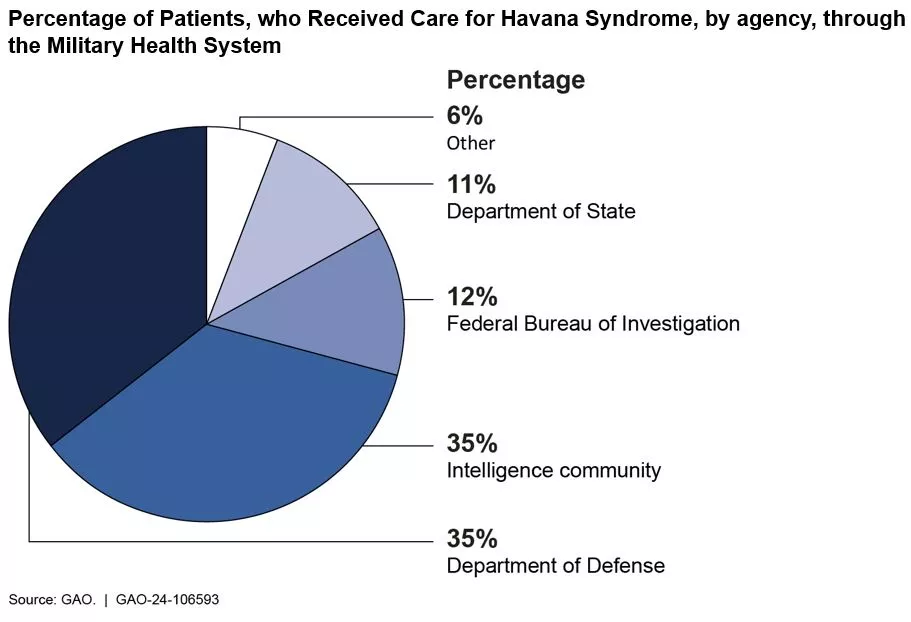Havana Syndrome—Americans Affected by Mysterious Symptoms May Struggle to Get Care
Severe headaches, dizziness, blurred vision, tinnitus, vertigo. About a decade ago, American officials and their families living and working at the U.S. Embassy in Havana, Cuba, started experiencing mysterious symptoms like these. Symptoms usually followed a loud noise and intense pain in the ears and head.
They weren’t alone. Other Americans have also reported similar symptoms. They have sought medical treatment, but struggled to access the care they need.
Today’s WatchBlog post looks at our report on “Havana Syndrome” and what’s being done to help survivors.
Image

Although it’s named Havana Syndrome, cases have been reported around the globe
“Havana Syndrome” was so named by the media because the first widely reported cases occurred there. But cases of these symptoms have also been reported in other countries—including Austria, China, Colombia, Georgia, Germany, India, Poland, Russia, Vietnam, and even in the continental United States.
The number of victims is unknown, but as many as 334 Americans with relevant symptoms qualified for care in the military health system. Americans reporting symptoms were often federal employees in the intelligence community and various other agencies, as well as their families. They have reported experiencing symptoms in workplaces, residences, and even during daily commutes. While the reported signs and symptoms vary, in some cases their severity has led to lasting cognitive, sensory, and balance problems.
Image

There aren’t definitive answers yet on what or who is causing this syndrome—also known as “Anomalous Health Incidents” or AHIs. The CDC, NIH, and the National Academies of Sciences are among the agencies and researchers looking for answers.
One study concluded it is “very unlikely” a foreign adversary is responsible for the abrupt-onset, location-dependent issues. Other studies note that some form of radio frequency energy or focused ultrasound could be causing the symptoms.
While questions remain about the origins, medical researchers agree that quick patient evaluation and treatment is essential for those suffering from Havana Syndrome.
Survivors need treatment but may struggle to access care
Survivors we interviewed said that, overall, they received inconsistent support from their employers when seeking treatment. They told us about difficulty scheduling appointments and getting reliable information from health care providers for this poorly understood condition with unknown causes.
Congress approved legislation that would provide survivors with care through the Department of Defense’s (DOD) military health system. But DOD has also reported delays in meeting timeframes for providing that care.
Many patients we spoke with also said they struggled accessing care through the military health system, in part because they were unfamiliar with how it works. For example, many patients told us they hadn’t received information on how to use the military health system and what care options were available to them. Some reported not receiving basic information about their assigned medical facility and how to access it. And others reported issues with scheduling appointments and accessing health care records and prescriptions through military health system pharmacies.
What more could DOD do to better serve these patients?
Better communication from DOD could help patients—including written guidance on standardized care with clear treatment expectations and timelines.
DOD has begun developing a “Care Coordination Cell” to manage patient care. This effort could provide a treatment plan that clearly outlines what care patients will receive through the military health system. It could also potentially address several issues patients told us about, such as not knowing who to contact about an issue or scheduling. But we found that DOD’s timeframes for completing this plan are still uncertain. We recommended DOD improve its guidance and communications with patients, as well as monitor the care patients receive to ensure it meets their needs.
DOD has also developed a trauma registry to collect patient data on treatments and outcomes. This information could improve the care patients receive. But more work needs to be done, including ensuring patients who have finished treatment consent to sharing their information. As of May, DOD had entered data for only 33 of the 334 patients who qualified for care. We recommended DOD reach out to former patients to collect this data to inform future care and ongoing research on this syndrome.
Learn more about our work by reading our full first report on Havana Syndrome.
- GAO’s fact-based, nonpartisan information helps Congress and federal agencies improve government. The WatchBlog lets us contextualize GAO’s work a little more for the public. Check out more of our posts at GAO.gov/blog.
- Have a question? Email us at blog@gao.gov.
GAO Contacts
Related Products

GAO's mission is to provide Congress with fact-based, nonpartisan information that can help improve federal government performance and ensure accountability for the benefit of the American people. GAO launched its WatchBlog in January, 2014, as part of its continuing effort to reach its audiences—Congress and the American people—where they are currently looking for information.
The blog format allows GAO to provide a little more context about its work than it can offer on its other social media platforms. Posts will tie GAO work to current events and the news; show how GAO’s work is affecting agencies or legislation; highlight reports, testimonies, and issue areas where GAO does work; and provide information about GAO itself, among other things.
Please send any feedback on GAO's WatchBlog to blog@gao.gov.



